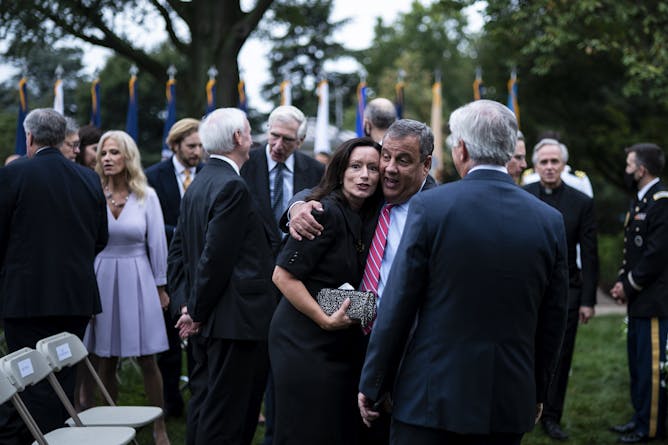|
Just because you’re outdoors doesn’t mean you’re safe from the coronavirus. Lean in close for a conversation, shake hands, start hugging people without a mask on, and your risk level rises fast. And just one sneeze from an infected person in your face could infect you, too.
This is as true for you and me as it is for guests at a recent White House Rose Garden ceremony. The fact is, being outside isn’t risk-free but there are ways to make it safer, as University at Buffalo infectious disease doctor Thomas Russo explains.
Also today:
|
Stacy Morford
General Assignments Editor
|

|
|

Former New Jersey Gov. Chris Christie, hugging another guest; Kellyanne Conway (left); and Notre Dame University President Rev. John Jenkins (right) later tested positive for COVID-19.
The Washington Post via Getty Images
Thomas A. Russo, University at Buffalo, The State University of New York
The outdoors is less risky than an enclosed room, but it isn't a COVID-free zone. Here's what you need to know.
|
Politics/Election '20
|
-
Jennifer Spindel, University of New Hampshire; Matt Motta, Oklahoma State University; Robert Ralston, University of Minnesota
People typically underestimate how much white nationalism goes on in the military, but when they learn the truth, they're concerned.
-
Donald Brand, College of the Holy Cross
Biden and Trump are both preparing for a court battle in November. But when the Electoral College produces no clear winner, it's the House of Representatives that's supposed to select the president.
|
|
Education
|
-
Matthew J. Landry, Stanford University; Heather Eicher-Miller, Purdue University
Concerns about having enough to eat are worsening among college students during the pandemic. This could ultimately affect how many finish school, two scholars argue.
|
|
Health
|
-
Kartikeya Cherabuddi, University of Florida
With a COVID-19 outbreak in the White House, people are watching the health of President Trump and many others. A doctor explains the possible course for this unpredictable disease.
-
Matthew Woodruff, Emory University
Patients suffering from severe COVID-19 may be experiencing a rogue antibody response similar to that seen in autoimmune diseases. The findings offer new approaches for COVID-19 therapy.
|
|
Economy + Business
|
-
Sara Konrath, IUPUI; Femida Handy, University of Pennsylvania
Two scholars have found links between generosity and physical attractiveness.
|
|
Environment + Energy
|
-
Carol Kwiatkowski, North Carolina State University
PFAS chemicals are toxic, widespread and persistent in the environment, and the federal government has been slow to regulate them. A scientist explains why evaluating them one by one isn't working.
|
|
Arts + Culture
|
-
Peter Lehman, Arizona State University
Directors and audiences are becoming more comfortable with male frontal nudity. But what message does it send when almost all of the penises shown aren't real?
|
|
Science + Technology
|
-
John Sohrawardi, Rochester Institute of Technology; Matthew Wright, Rochester Institute of Technology
Fake videos generated with sophisticated AI tools are a looming threat. Researchers are racing to build tools that can detect them, tools that are crucial for journalists to counter disinformation.
|
|
From our International Editions
|
-
Kevin Marsh, University of Oxford; Moses Alobo, African Academy of Sciences
The gap between predictions of COVID-19 deaths in Africa and what has actually happened is staggering.
-
Shane Satterley, Griffith University
A Facebook ban on QAnon may not be the best way to address the fast-growing far-right conspiracy movement.
-
Sara Callahan, Stockholm University
New York's Guggenheim Museum has acquired Maurizio Cattelan’s Comedian but how can you value and own a banana and some tape?
|
|
| |
| |
| |
| |
| |
| |
|
|